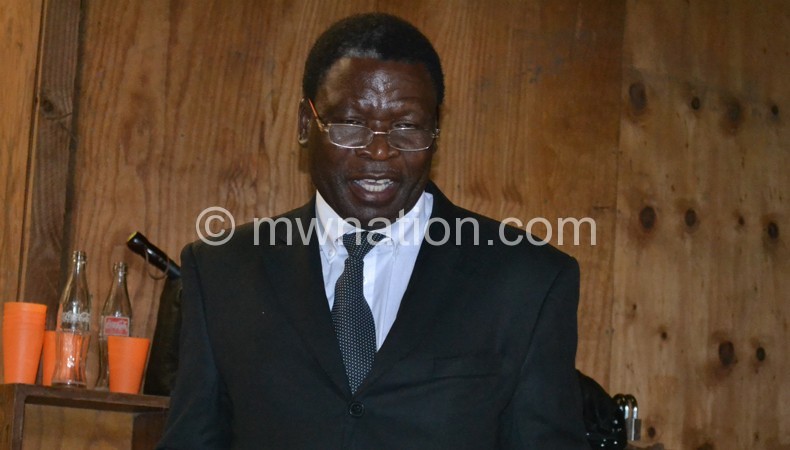‘Countries need organised repositories’
In 2009, Malawi embarked on an initiative called the National Digital Repository (NDR) that, among other things, houses electronic research documents either on the country or done by Malawian researchers elsewhere.
Our reporter FATSANI GUNYA caught up with the National Library Service (NLS) head GRAY NYALI who expounds on the initiative.
| Q |
What is the National Digital Repository initiative all about?
| A |
It is a digitised collection of papers written by professionals from universities, colleges, research institutions and private consultants in Malawi. It is the brainchild of the Malawi Library and Information Consortium (Malico) and is hosted by the National Library Service (NLS). It started as a project funded by the Institute of Development Studies (IDS) of the University of Sussex in the United Kingdom, who were getting their funding from DfID. ICT technicians from NLS, National Commission of Science and Technology (NCST) and Kamuzu College Nursing (KCN) under the University of Malawi (Unima) were trained by the technicians from IDS. The technicians were involved in planning the procurement of equipment and installation of software. Several workshops were conducted with the stakeholders to sensitise them on the importance of contributing papers to the NDR. At the end of project, NDR was handed over to NLS to run on behalf of all Malico members. This collection is accessible online anywhere in the world on http://www.ndr.mw:8080/xmlui.
Q
What is involved to have such a system?
A
First, one must have all required hardware and Internet connectivity. Second, you need to install and configure a digital repository software on the server and we installed an open source (free) software application known as Dspace, which is now the platform for the NDR. Third, you need to collect research documents from researchers and clear all access rights issues with the researchers or publishers. NDR documents are accessed based on Creative Common License (CCL) which allows patrons to freely use the resources in the repository on non-commercial purposes. Therefore, we ensure that the authors and publishers agree to these terms.
Q
At what stage are we now?
A
The NDR is up and running and interested users are accessing the electronic documents through the Internet. Staff from NLS and NCST is continuing with collections of documents. The professionals are still contributing papers. It is a growing collection and getting popular by the day. This is the future of any organised democratic nation.
At this stage, however, we have three challenges. First, we do not have a reliable power backup for our server. When we have no power the server usually goes down. We need to acquire a powerful generator or a solar energy system to act as power backup. And then the cost of services that we get from Internet service provider is higher than our annual budget. This means we have to find means of generating more income for us to meet this need. Furthermore, the process of collecting documents requires our staff to visit researchers across the country and these are expensive exercises. We need more funds to maintain such an important initiative.
Q
What has necessitated acquisition of the NDR?
A
Countries that have made advances in research have well-organised repositories. Developed countries have sophisticated collections of their written heritage. NLS is, therefore, simply fulfilling its mandatory role in hosting the NDR. NCST has an obligation to partner with NLS because they are a body charged with developing science and technology in Malawi.
Q
What are the benefits of having such a system?
A
We, as a nation, involved in research and development are supposed to preserve our written and published works by our professionals for posterity. Our scientists and researchers are supposed to have access to local collection of published works for references and this repository does just that. Malawians studying at different universities and institutions across the globe have access of Malawian researched information online at the touch of a button. Previously students studying abroad had to come back home to access information about Malawi costing them a fortune.
Q
About eight years ago, NLS embarked on yet another project to have all councils in the country run a library service. How did it go and what’s the current status?
A
In 2007, we partnered with Code, an NGO from Canada which was being funded by Cida. One of the activities was to set up libraries in 20 district councils where we did not have a National Library Service branch. In summary, we were able to work with the rest of the district councils in Malawi apart from Chitipa. Officials at the council kept promising that they would identify a building to be used as a library. These promises did not material until 2012 when the project came to an end. We were also supposed to train at least two members of staff from each council to work in the library. Currently, to my knowledge, there is no library at Chitipa District Council.
Q
NLS also runs the mobile library service. Where are we with that project?
A
The mobile library service was launched in December 2013 at Chinsapo Primary School in Lilongwe. It was launched as a pilot project in the Central Region pending rolling it out to all the three regions of Malawi. So far it has proved to be successful and we are planning to buy more mobile library vans when we get resources. We rate this intervention highly because we are able to reach out to many underprivileged users.
We also use the mobile library during commemoration of international and local literacy events in partnership with other stake holders such as the Ministry of Gender, Children, Disability and Social Welfare.





